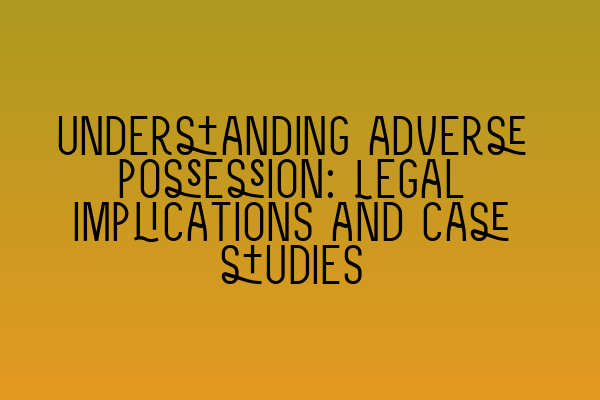Understanding Adverse Possession: Legal Implications and Case Studies
Welcome to the SQE Property Law & Land Law blog, where we delve into the fascinating world of property law and provide you with valuable insights. In this post, we will explore the concept of adverse possession, its legal implications, and examine some interesting case studies. So, let’s dive right in!
Adverse possession refers to a legal principle that allows a person to claim ownership of another person’s property if they have been in continuous and uninterrupted possession of it for a specified period of time. This principle aims to provide stability and certainty in land ownership, even in cases where historical records may be unclear or unavailable.
The legal implications of adverse possession can be complex and vary depending on the jurisdiction. In the United Kingdom, for example, the governing law is the Land Registration Act 2002. According to this law, if someone can prove that they have been in adverse possession of a property for at least 10 years, they may be able to obtain legal title to the property.
To establish adverse possession, certain criteria must be met. Firstly, the possession must be “adverse,” meaning it is without the permission or consent of the true owner. Secondly, the possession must be “exclusive,” indicating that the possessor has sole control and occupation of the property. Thirdly, the possession must be “open and notorious,” meaning that it is visible and apparent to the true owner. Lastly, the possession must be “continuous” for the specified period of time, typically 10 or 12 years.
Let’s explore some intriguing case studies that highlight the application of adverse possession in real-world scenarios.
Case Study 1: Greenfield Park
In the case of Greenfield Park, Mr. Johnson had been using a small strip of land that adjoined his property as a garden for over 10 years. The land was originally part of a larger estate, but the true owner hadn’t taken any action during this period. Mr. Johnson sought legal advice and was able to successfully claim ownership through adverse possession, as he fulfilled all the necessary requirements.
Case Study 2: Riverside Cottage
Riverside Cottage presented a unique scenario. The cottage had been in the possession of the Thompson family for generations. However, due to an administrative error, the property was not registered in their name. When the government initiated a land registration scheme, the Thompson family realized their property was not officially recognized. They relied on adverse possession and were able to prove continuous occupation for over 30 years, thereby securing their ownership rights.
These case studies showcase the power of adverse possession in enabling individuals to claim ownership of land they have used and occupied for an extended period. However, it’s essential to remember that adverse possession is a legal procedure that requires careful consideration and adherence to the specific legal requirements.
If you find yourself dealing with a potential adverse possession claim, it is crucial to consult with an experienced property solicitor who can guide you through the process and ensure that all necessary steps are taken.
At SQE Property Law & Land Law, our team of expert solicitors specializes in property-related matters and can provide you with the expert guidance and support you need. Contact us today to schedule a consultation and discuss your specific circumstances.
In conclusion, adverse possession is a powerful concept in property law, allowing individuals to acquire legal ownership of land they have occupied without the true owner’s consent. Understanding the legal implications and requirements of adverse possession is crucial, and seeking professional advice is essential to navigate this complex area of law.
Remember to check out our related articles for additional insights and information on SQE exam preparation and important dates:
– SQE 1 Practice Exam Questions
– SQE 1 Practice Mocks FLK1 FLK2
– SQE 2 Preparation Courses
– SQE 1 Preparation Courses
– SRA SQE Exam Dates
Thank you for joining us on this informative journey into understanding adverse possession. Stay tuned for more intriguing topics and legal insights in the world of property law.
